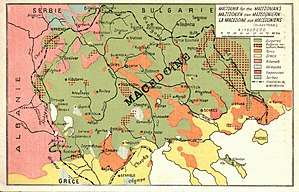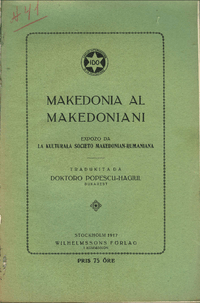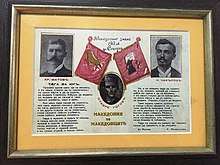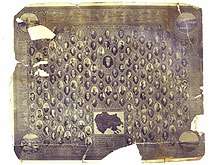Macedonia for the Macedonians
Macedonia for the Macedonians is a political slogan used during the first half of the 20th century in the region of Macedonia.


History
The slogan was first used in 1880 by the National Assembly of Macedonia, who wanted to repeal Article 23 of the Treaty of Berlin and advocated for an independent Macedonian state.[2]
British politician William Ewart Gladstone used the slogan in 1897, when he promoted an idea on a mini-Balkan Federation of Macedonia, Bulgaria and Serbia.[3][4] Gladstone appealed for the right of self-determination of the peoples who resided in the region, while Britain regarded the creation of an autonomous Macedonia with a Christian governor as a possible solution of the Macedonian issue.[5] On that occasion, the British journalist G. W. Steevens noted in the preface of the brochure containing the letter of Gladstone, that he has used "Macedonians" as a collective name of the diverse population of the region.[6] Steevens explained that there were at least six different kind of Macedonians at that time.[7] Once Gladstone launched the motto, this maxim became widely known. In 1898, the historian William Miller argued against Gladstone's proclamation and his motto, arguing that this idea would not be practical, as a Macedonian nation did not exist at the time, and that a problem for the Macedonian state would be the mixture of different warring nationalities.[8] By that reason per Allen Upward that phrase could not have been used by anybody, who had a first hand knowledge of that country.[9]

The motto was adopted by the Internal Macedonian-Adrianople Revolutionary Organization (IMARO) and by the "Society for Macedo-Romanian Culture", in the early 20th century. At that time, according to Vasil Kanchov the local Bulgarians and Aromanians called themselves Macedonians, and the surrounding nations called them so.[11]
Internal Macedonian-Adrianople Revolutionary Organization
In an article published in June, 1902, the IMARO revolutionaries promoted the idea of autonomy and the slogans "Macedonia for the Macedonians".[12] The Organization gave a guarantee for the preservation of all national communities there, and insisted that the Bulgarians could be proud of their tolerance, in opposition to Romanians, Serbs and Greeks. They also planned that the administration of the future autonomous Macedonia will rely on the Bulgarian majority. In the same year the Organization changed its exclusively Bulgarian character,[13] and opened it to all Macedonians and Thracians regardless of nationality, who wished to participate in the anti-Ottoman movement.[14] Those revolutionaries saw the future autonomous Macedonia as a multinational polity, and "Macedonian" was an umbrella term covering Greeks, Bulgarians, Turks, Vlachs, Albanians, Serbs, etc.[15] Nevertheless, the British Consul in Skopje Raphael Fontana wrote on the occasion of the Ilinden uprising in 1903 that the revolutionaries were working for a general Bulgarian uprising in order to reach their goal of "Macedonia for the Macedonians", understood to mean "Macedonia for the Bulgarians".[16] According to the prevailing view in the Bulgarian historical science, the idea of autonomy represented only a tactics aiming at the eventual unification with Bulgaria.[17] Some independent researchers suggests that behind the slogan "Macedonia for the Macedonians" there was a backup plan for the incorporation of Macedonia into the Bulgarian state.[18][19]
MPO and IMRO

The Balkan Wars (1912–1913) and World War I (1914–1918) left the area divided mainly between Greece and Serbia (later Yugoslavia), which resulted in significant changes in its ethnic composition.[20] The Bulgarian community was reduced, either by population exchanges or by forcible change of communities' ethnic identity.[21] In this way the motto began to lose its authenthic character. Macedonian immigrants in the United States and Canada founded in 1922 in Fort Wayne, Indiana, the Macedonian Patriotic Organization. The founders of the MPO in their aspirations for a free and independent Macedonia also accepted the slogan "Macedonia for the Macedonians". The use of "Macedonians" and "Macedonian emigrants" then equally applied to all ethnic groups in Macedonia - Bulgarians, Wallachians, Turks, Albanians, Greeks and others.[22] During the 1920s the descendant of the IMARO - IMRO followed also the idea about an independent United Macedonian multiethnic state with prevailing Bulgarian element, something as "Switzerland on the Balkans" and kept the slogan Macedonia for the Macedonians until its defunction in 1934.[23]
The Macedo-Romanian Cultural Society
"The Macedo-Romanian Cultural Society" had as its members the acting Prime and Foreign Ministers, as well as the Head of the Romanian Orthodox Church, and the elite of the Romanian political class. In 1912 an Aromanian memoir was published in Bucharest, after the outbreak of the Balkan War. The memoir was signed by five prominent Romanian and Aromanian public figures, members of the Society. In it, the Macedonian-Aromanian Culture Society, using the slogan Macedonia for the Macedonians, stated that Macedonia's autonomy is the best solution of the Macedonian question. As the region was ethnically diverse, an autonomous, neutral, cantonized by Swiss model state was proposed, where all nationalities will preserve their mother tongues and religions, enjoying the same democratic political rights.[24] In 1917, during the First World War, the memoir was translated into Esperanto and was published in Stockholm. The memoir was presented to the Peace Conference in Paris in 1919.
See also
- Svoboda ili smart
- United Macedonia
- Autonomy for Macedonia
- Macedonian Question
- Macedonian nationalism
- Vlach Millet
- Principality of Pindus
Notes
- Makedonia Al Makedoniani: expozo da La Kulturala Societo Makedonian-Rumaniana (PDF). Stockholm: Wilhelmssons Förlag. 1917. Retrieved 30 March 2019.
- Konstantinov, Konstantin Markov (1969). Balgarskata ekzarhiya v Odrinsko i Makedoniya sled Osvoboditelnata vojna (1877–1878). Sofia: Sinodalno izdatelstvo. pp. 461–466.
- The hopelessness of the Turkish Government should make me witness with delight its being swept out of the countries which it tortures. Next to the Ottoman Government nothing can be more deplorable and blameworthy than jealousies between Greek and Slav and plans by the States already existing for appropriating other territory. Why not Macedonia for the Macedonians as well as Bulgaria for the Bulgarians and Serbia for the Serbians? Letter quoted in Mr. Gladstone and The Balkan Confederation in The Times (6 February 1897).
- Keith Brown, Loyal Unto Death: Trust and Terror in Revolutionary Macedoni, Indiana University Press, 2013, ISBN 0253008476, pp. 15-16.
- Vlasis Vlasidis, “Macedonia and the Great Powers”, p. 333.
- Пантев, Андрей, Генов, Румен, „Уилям Гладстон и българите Политика на праведна страст“, ТАНГРА ТанНакРа, София, 1999, стр. 166.
- Lieberman, Benjamin (2013). Terrible Fate: Ethnic Cleansing in the Making of Modern Europe. Rowman & Littlefield. ISBN 978-1-4422-3038-5.CS1 maint: ref=harv (link), p. 56.
- Miller, William (1898). Travels and Politics in the Near East. pp. 388. Retrieved 30 March 2019.
- Allen Upward, The East End of Europe, 1908: The Report of an Unofficial Mission to the European Provinces of Turkey on the Eve of the Revolution, pp. pp. 25-27.
- Стружко културно-просветно братство "Братя Миладинови" - "Братя Миладинови Димитър 1810 и Константин 1830 - за памет на 75 години от мъченишката им смърт (1862 януарий 1937)"; София, 1937 година.
- According to Vasil Kanchov: "The local Bulgarians and Kucovlachs who live in the area of Macedonia call themselves Macedonians, and the surrounding nations also call them so. Turks and Arnauts from Macedonia do not call themselves Macedonians, but when asked where they are from, they respond: from Macedonia. Arnauts from the north and north west limits of the area, who also call their country Anautluk, and Greeks who live in the southern areas, do not call themselves Macedonians, hence the borders in these areas according to the peoples’ perception are not clearly defined." For more see: E. Damianopoulos, The Macedonians: Their Past and Present, Springer, 2012, ISBN 1137011904, p. 185.
- For more see: Tchavdar Marinov, We, the Macedonians, The Paths of Macedonian Supra-Nationalism (1878–1912) in: Mishkova Diana ed., 2009, We, the People: Politics of National Peculiarity in Southeastern Europe, Central European University Press, ISBN 9639776289, pp. 117-120.
- Initially the membership in the IMRO was restricted only for Bulgarians. Its first name was "Bulgarian Macedonian-Adrianople Revolutionary Committees", which was later changed several times. IMRO was active not only in Macedonia but also in Thrace (the Vilayet of Adrianople). Since its early name emphasized the Bulgarian nature of the organization by linking the inhabitants of Thrace and Macedonia to Bulgaria, these facts are still difficult to be explained from the Macedonian historiography. They suggest that IMRO revolutionaries in the Ottoman period did not differentiate between ‘Macedonians’ and ‘Bulgarians’. Moreover, as their own writings attest, they often saw themselves and their compatriots as ‘Bulgarians’. All of them wrote in standard Bulgarian language. For more see: Brunnbauer, Ulf (2004) Historiography, Myths and the Nation in the Republic of Macedonia. In: Brunnbauer, Ulf, (ed.) (Re)Writing History. Historiography in Southeast Europe after Socialism. Studies on South East Europe, vol. 4. LIT, Münster, pp. 165-200 ISBN 382587365X.
- Ivo Banac. (1984). The National Question in Yugoslavia: Origins, History, Politics. Ithaca, N.Y.: Cornell University Press. p. 315. ISBN 978-0801494932. Retrieved March 30, 2019.
- Bechev, Dimitar. Historical Dictionary of the Republic of Macedonia, Historical Dictionaries of Europe, Scarecrow Press, 2009, ISBN 0810862956, Introduction.
- Nikolaos K. Martēs, Deborah Whitehouse, The Macedonians and their contribution to Western civilization, Edition 2, Diachronikes Ekdoseis, 2002, ISBN 9608172055, p 116.
- Димитър Гоцев, Идеята за автономия като тактика в програмите на национално-освободителното движение в Македония и Одринско 1893-1941, Изд. на БАН, София, 1983 г.
- Anastasia Karakasidou, Fields of Wheat, Hills of Blood: Passages to Nationhood in Greek Macedonia, 1870-1990, University of Chicago Press, 2009, ISBN 0226424995, p. 100.
- İpek Yosmaoğlu, Blood Ties: Religion, Violence and the Politics of Nationhood in Ottoman Macedonia, 1878–1908, Cornell University Press, 2013, ISBN 0801469791, p. 16.
- "At the end of the World War I there were very few historians or ethnographers, who claimed that a separate Macedonian nation existed... Of those Macedonian Slavs who had developed then some sense of national identity, the majority probably considered themselves to be Bulgarians, although they were aware of differences between themselves and the inhabitants of Bulgaria... The question as of whether a Macedonian nation actually existed in the 1940s when a Communist Yugoslavia decided to recognize one is difficult to answer. Some observers argue that even at this time it was doubtful whether the Slavs from Macedonia considered themselves to be a nationality separate from the Bulgarians." The Macedonian conflict: ethnic nationalism in a transnational world, Loring M. Danforth, Princeton University Press, 1997, ISBN 0-691-04356-6, pp. 65-66.
- Ivo Banac, The National Question in Yugoslavia: Origins, History, Politics, Cornell University Press, 1988, ISBN 0801494931, p. 33
- "Note" to Article 28 in the first chart of MPO.
- Victor Roudometof, "Collective Memory, National Identity, and Ethnic Conflict: Greece, Bulgaria, and the Macedonian Question, Greenwood Publishing Group, 2002, ISBN 0275976483, p. 99.
- Tanașoca, Anca, Nicolae-Șerban Tanașoca. Unitate romanică și diversitate balcanică. Editura Fundației PRO, 2004. p. 156.